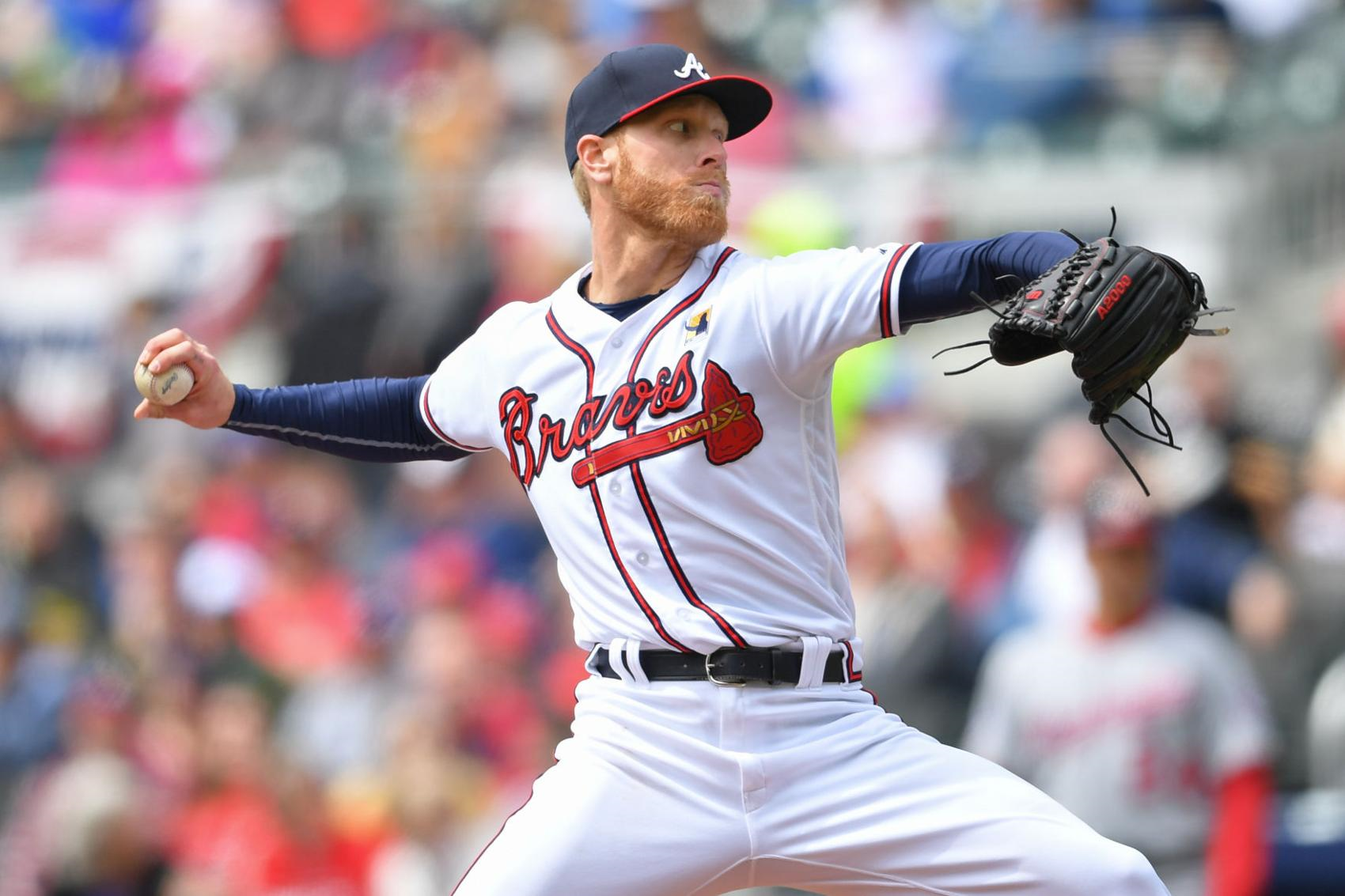
The Braves have made the playoffs, and everybody should be thrilled but now it’s time, as Freddie Freeman put it after clinching, to win 11 more baseball games. That’s how many wins it will take for whichever team wins the World Series.
The team that will try to deny the Braves those first 3 wins will be the Los Angeles Dodgers, who defeated the Colorado Rockies on Monday in a 163rd regular season game to determine who won the National League West division title.
The reigning National League pennant winners, the Dodgers are a formidable team that beat Atlanta 5 games to 2 in regular season match-ups in 2018. The Dodgers had the NL’s top offense, scoring an average of 4.93 runs per game. They accomplished this primarily with power, leading the league in slugging percentage and out-homering the second place Milwaukee Brewers as a team by 17 HR. This post will discuss the Dodgers expected line-ups, and how the Braves will try to neutralize them.
Game 1: Braves at Dodgers, 8:30 p.m. Thursday, MLB
Game 2: Braves at Dodgers, 9:30 p.m. Friday, FS1
Game 3: Dodgers at Braves, 8:00 p.m. Sunday, FS1
Game 4*: Dodgers at Braves, Monday, October 8, Time TBD, FS1
Game 5*: Braves at Dodgers, Wednesday, October 10, Time TBD, FS1
*if necessary
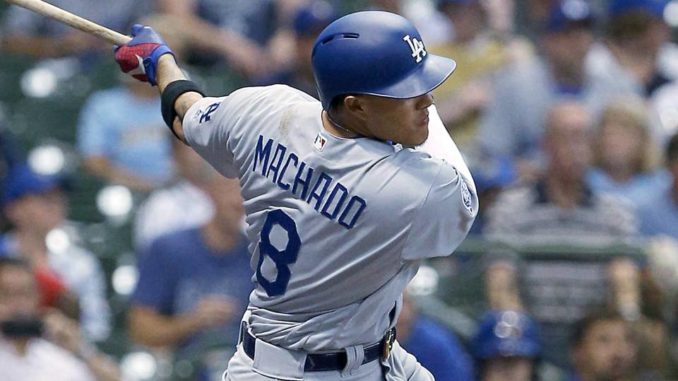
Dodgers Line-Up
Versus right-handed starters, this is the most typical line-up that Dodgers manager Dave Roberts has been employing toward the end of the season.
- LF Joc Pederson
- 3B Justin Turner
- 1B Max Muncy
- SS Manny Machado
- C Yasmani Grandal
- CF Cody Bellinger
- RF Yasiel Puig
- 2B Enrique Hernandez
As the Braves will likely start right-handers Mike Foltynewicz, Anibal Sanchez, and Kevin Gausman in some order for the first three games, this is something like the line-up they will see.
Over the second half of the season, those starting 8 have a combined .278/.361/.514 batting line, which goes a long way toward explain their second-half surge to the division title. A major part of this has been the return to form of third baseman Justin Turner, who suffered a broken wrist after being hit by a pitch in spring training. He leads the offense with a 190 second-half wRC+.
Hitting in front of Turner will likely be outfielder Joc Pederson, who has significant lefty/right splits. Against right-handers, Pederson has been one of the best hitters in the National League this season, sporting a 140 wRC+despite only hitting .269 when putting the ball in play.
First baseman Max Muncy has been the second most productive hitter in the National League in 2018 against right-handed pitching, behind only presumed league MVP Christian Yelich of the Brewers, hitting .266/.401/.601 with 27 home runs this season against righties. His 30.7% home run-to-fly ball ratio vs righties is third in the league. In short, pitchers will not want to have Muncy get the ball in the air.
Shortstop Manny Machado was the biggest name to be traded at the deadline this year, giving the Dodgers an All-Star upgrade at a position that they team had been struggling with since incumbent Corey Seager went down with a UCL sprain that required season-ended Tommy John surgery in May. Perhaps not surprisingly, Machado’s offensive production dropped when he switched leagues, but he still posted an overall 121 wRC+ on the season. He’s struggled more against right-handed pitching, but he is still an above average and very dangerous hitter against them.
Yasmani Grandal not only is one of the best defensive starting catchers in the majors, but this season he has been the top offensive catcher as well. He has been particularly strong against right-handers with a 131 wRC+.
Cody Bellinger is that rare first baseman that can also play a credible center field, which is good because Muncy is a must-have in the line-up against right-handers but is most unplayable anywhere but first base. Bellinger isn’t a slouch against righties either, producing a 137 wRC+ against them this year.
Yasiel Puig comes into the playoffs red hot, with a 182 wRC+ for the month of September. Puig has battled most of the season with Matt Kemp for playing time in right field, but despite Kemp also heating up down the stretch, Puig’s superior defense will likely keep him in the line-up. Despite being a right-handed batter, he has struggled against left-handers.
Finally, Enrique ‘Kiki’ Hernandez has been a spark-plug type of player for Los Angeles all season and could bat almost anywhere in the line-up and play almost anywhere on the field. He’s been a 127 wRC+ hitter in 2018.
Perhaps what is most impressive about the Dodgers is who that leaves on the bench: Chris Taylor, David Freese, Matt Kemp, Brian Dozier, and Austin Barnes. All but Barnes would likely be in the line-up against a left-handed starter, with Taylor leading off and playing centerfield, Kemp replacing Puig in right field, Freese replacing Muncy at first base, Hernandez moving to left field, and Dozier playing second.
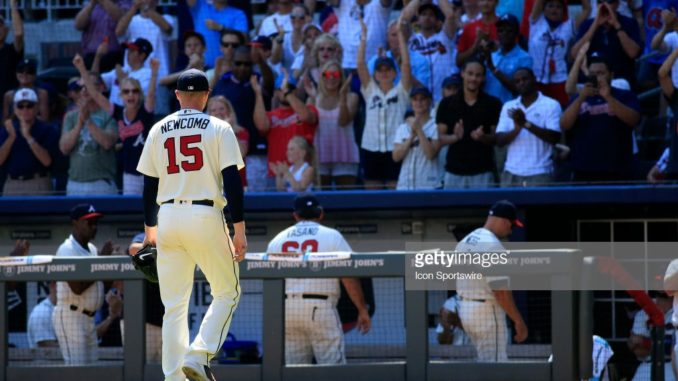
Braves Starting Pitching
As mentioned before, the Braves are expected to go with Mike Foltynewicz, Anibal Sanchez, and Kevin Gausman in Games 1-3. For Game 4, the choices appear to be between left-hander Sean Newcomb, Julio Teheran, or bringing Foltynewicz back on three days rest.
Game 1 starter Mike Foltynewicz has not fared particularly well against the Dodgers over the last two seasons, though he only has two starts against them in that time. In his only start against them in 2018, Foltynewicz allowed 4 runs over 5 innings on July 27 with Yasmani Grandal taking him deep. However Foltynewicz has seemed to have found another gear since then, pitching to a 2.55 ERA with 69 strikeouts to only 20 walks in 71 innings. Foltynewicz has actually allowed less contact to left-handed hitters than right-handers in 2018, though lefties that have hit him have overall done more damage.
Foltynewicz works best against left-handers when he has his slider diving down and in on them. He can complement that with his improved change-up low and away. Foltynewicz will need to move the ball in-and-out and up-and-down to keep Dodger hitters off-balance and above all avoid the middle of the zone. Emotions will be high in his first major league postseason start, and when Foltynewicz has his adrenaline going he tends to overthrow and leave the ball up in the zone too much.
The Braves have not announced their Game 2 or 3 starter at the time of this writing, but they will almost certainly be Anibal Sanchez and Kevin Gausman in some order. Sanchez gave up 6 runs in 11.2 innings over two starts against the Dodgers in the regular season, with Muncy and Machado taking him deep. That said, the Dodgers could be a good match-up for Sanchez, who has handled left-handers well overall and has severely limited hard contact. Since the his second start against Los Angeles at the end of July, Sanchez like Foltynewicz has found another gear, pitching to a 2.61 ERA and striking out 61 in 58.2 innings. Sanchez should pitch the Dodgers like he has pitched everyone all season, mixing speeds and showing different looks in unexpected counts. The Dodgers hitters will be looking to hit the ball up in the air, and Sanchez can use that to his advantage by running his change-up in on the left-handers.
Gausman could be a pivotal player in this series; the only Dodger that has significant experience hitting against him is second baseman Brian Dozier, who has had only moderate success against him. Unfortunately, over the past month, Gausman has missed more often in the zone, and that has resulted in more hard hits against him. If Gausman is on his game, he could have success against a line-up that want to launch the ball by working down-and-in on the left-hander hitters with his split-finger fastball and out-and-away with the slider against righties.
If there is a Game 4, the Braves could elect to bring Foltynewicz back on three-day’s rest or turn to Sean Newcomb or Julio Teheran. While it may be tempting to go with the veteran Teheran who has pitched well down the stretch for Atlanta, it seems equally as likely that the Braves will tap the lefty Newcomb. Newcomb came one out away from no-hitting the Dodgers on July 29, though that team did not have Manny Machado or David Freese on it. Freese has been a monster in the second half for both the Pirates then the Dodgers after the trade deadline, and will certainly find the line-up against a left-handed starter. There will be a lot of talk about how the Dodgers are vulnerable against left-handers; that’s true only in that they hit right-handers better. They were still the third most productive offense against left-handed pitchers by wRC+ in 2018, and how they handled lefties down the stretch had a lot to do with that. To be successful, Newcomb will have to have his change-up working, as he did on July 29.
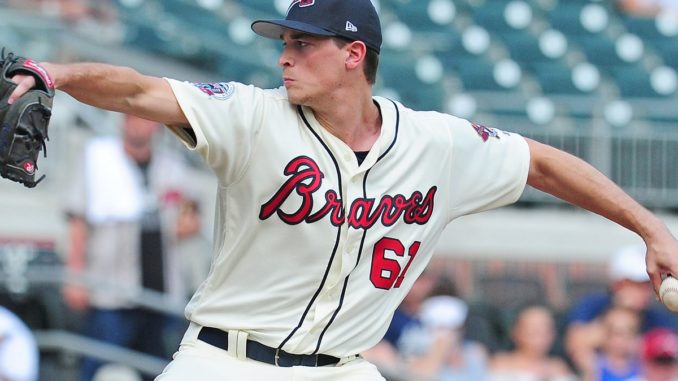
Braves Relief Pitching
The Braves likely won’t announce their NLDS roster until the last possible moment, but expect them to cram as many left-handed pitchers into the bullpen as possible. My guess is that A.J. Minter, Sam Freeman, Jesse Biddle, Jonny Venters, and Max Fried could all make the post-season roster, with Arodys Vizcaino, Brad Brach, Chad Sobotka, and Touki Toussaint holding down the right side.
The Braves bullpen has been, to put bluntly, terrible in the last month of the season. It can be chalked up to some degree to young pitchers throwing more than they ever have in their careers, but the fact is that Atlanta’s 15.6% walk rate in September has to get dramatically better this postseason for the Braves to advance to the next round of the playoffs.
Nevertheless, look for Brian Snitker to not hesitate to go to the bullpen if the starting pitcher gets into even a whiff of trouble. Being able to bring a multi-inning lefty like Max Fried, Jesse Biddle, or even Sam Freeman could force the Dodgers to switch out players to their bench, making them vulnerable in the late innings during pinch-hitting situations and damaging what is already a mediocre defensive squad. Fried in particular has been good against the Dodgers this season, limiting them to 2-for-15 with no extra base hits and striking out 7. Freeman and Biddle both have reverse-splits against left-handed hitters and should not be used simply as situational lefties, though they both have been used that way at times this season.
Two wild cards could be rookies Touki Toussaint and Chad Soboka, neither of whom having faced the Dodgers before. Both bring plus breaking pitches to the table, both can throw in the upper 90s, both can go multiple innings if required, and both have the capacity to dominate even a great line-up. Both also have a history of control problems that will likely have Snitker constantly on the top step. Sean Newcomb could also factor into the bullpen mix, especially if the team decides to with Foltynewicz on short rest for Game Four.
In the end, expect Snitker to lean heavily on veterans Arodys Vizcaino, Brad Brach, Jonny Venters, and rookie A.J. Minter in high-leverage situations. Vizcaino may have the freshest arm in the bullpen after missing significant time with shoulder inflamation, and may be asked to close out games, especially if Minter is used situationally earlier in a game. Minter and Venters should be used as the situational left-handers (as opposed to Biddle and Freeman). Brach has more post-season experience than anyone else in the bullpen, and has been one of the few Braves relievers not to issue a slew of walks the past month, and his ability to induce ground balls could be a big equalizer for the Braves.
Other possibilities for the post-season bullpen are all right-handers: Julio Teheran, Shane Carle, Dan Winkler, and Luke Jackson. Teheran would also be a candidate to make a Game 4 start and has pitched well down the stretch, but his combination of a career high walk rate and a propensity to surrender home runs doesn’t appear like a combination the Braves are interested in exploring in the first round of the playoffs. Of the three relievers, Carle may have the best shot at taking a spot as he’s mostly avoided the walk problems affecting most of the rest of the bullpen down the stretch, though he’s become increasingly hittable as the season has progressed.

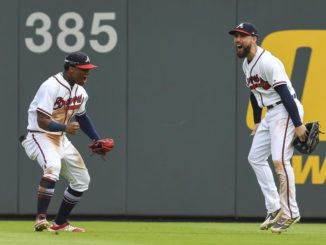
Leave a Reply